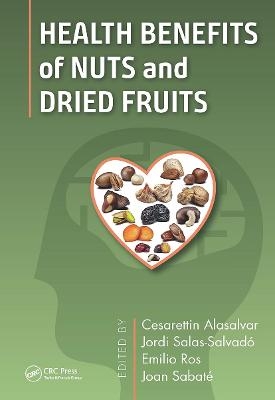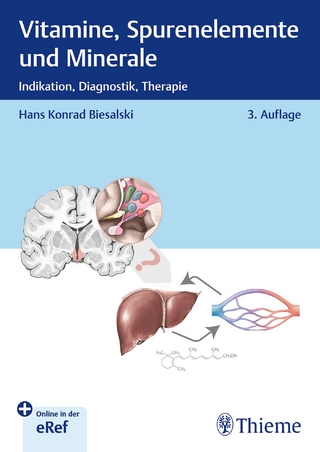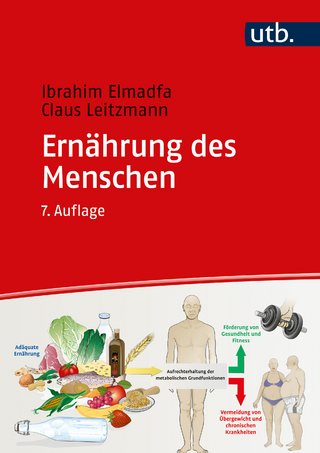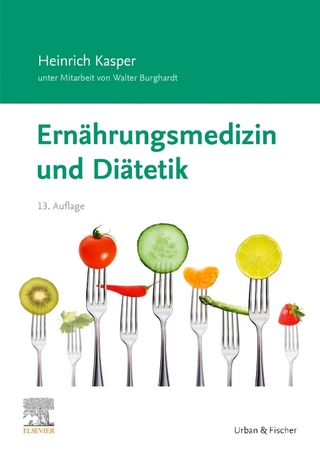
Health Benefits of Nuts and Dried Fruits
CRC Press (Verlag)
978-1-138-04284-1 (ISBN)
Nuts and dried fruits are part of our daily diet. They are consumed whole or as ingredients of many food products such as muffins, cereals, chocolates, energy bars, breads, and cookies, among others. Health Benefits of Nuts and Dried Fruits provides a comprehensive overview of the literature on the health benefits of nuts and dried fruits. The book summarizes the current state of knowledge in key research areas and provides ideas for future scientific research and product development.
Nuts, a term that comprises tree nuts and peanuts, are highly nutritious, containing health-promoting macronutrients, micronutrients, vitamins, and bioactive phytochemicals; they are one of the edible foods with the highest content in antioxidants. The consumption of nuts is recognized for its health-promoting properties, which ranges from a consistent cholesterol-lowering effect in clinical trials to a robust association with reduced risk of cardiovascular disease and all-cause mortality in prospective studies. In spite of the high energy content of nuts, there is no evidence that their frequent consumption promotes obesity, and they may even help control it.
Dried fruits, which serve as important healthful snacks worldwide, are nutritionally equivalent to fresh fruits while providing all of their bioactive components in concentrated form. While the evidence level concerning the health effects of dried fruits lags behind that on nuts, it suggests that individuals who consume dried fruits regularly have a lower risk of cardiovascular disease, obesity, and other non-communicable diseases.
Main features of the book concerning nuts and dried fruits:
• Provides detailed information on health effects
• Highlights current regulation and health claims
• Provides updated dietary recommendations
• Describes nutrient absorption and metabolism
• Discusses mechanisms implicated in the health effects
Although this book is intended primarily as a reference, by comprehensively reviewing the current state of knowledge it can guide future research on the topic. Among others, food scientists, biochemists, nutritionists, health professionals, decision makers, and regulatory agencies can draw much benefit from its contents. Hopefully, it will help in public health strategies to promote healthy aging and improve population wellbeing.
Cesarettin Alasalvar, Ph.D., FIFT, FISNFF, is the Director of the Food Institute at TÜBİTAK Marmara Research Center (MRC) in Turkey and is also an Associate Professor of Food Science and Engineering. His research interests focus mainly on development of functional foods and nutraceuticals, nutritional and functional properties of foods, bioactive properties of phytochemicals, and separation and identification of bioactives as well as bioavailability of foods and human clinical trials. Dr. Alasalvar has been active in the Institute of Food Technologists (IFT) programs for many years and served as a past chair of the Nutraceuticals and Functional Foods Division. He was one of the co-founders of the International Society for Nutraceuticals and Functional Foods (ISNFF) and also served as a past president of ISNFF. Dr Alasalvar is an editor of Food Chemistry journal and serves as an editorial board member of Journal of Functional Foods, Journal of Food Bioactives, and Food Production, Processing and Nutrition journal. He is active in Horizon 2020 Programme and has served as Turkish Delegate of Societal Challenges II (Food Security, Sustainable Agriculture and Forestry, Marine, Maritime and Inland Water Research, and the Bio economy) of the Horizon 2020 Programme Committee since 2017. He is also the Scientific Advisory Board Member of PRIMA (Partnership for Research and Innovation in the Mediterranean Area – Horizon 2020) and serves on the Academic Committee and World Forum for Nutrition Research and Dissemination Committee Members of International Nut and Dried Fruit Council (INC). Dr Alasalvar is the editor of six books and holds five patents. His work has led to the publication of over 100 research articles in the form of peer-reviewed journals (h-index of 36) and book chapters. He has considerable experience in coordinating numerous national and European Union funded projects (FP7-NutraHEALTH and IPA-INNOFOOD). Dr Alasalvar has received a number of prestigious international awards, including the IFT-Fellow Award (2012), the TÜBİTAK MRC – Most Successful Researcher Award (2012), the ISNFF-Merit Award (2014), the Sabri Ülker International Science and Innovation Award on Food, Nutrition, and Health (2015), and the ISNFF-Fellow Award (2019) in recognition of his pioneering scientific achievements. Jordi Salas-Salvadó, M.D., Ph.D., is Professor of Nutrition, director of the Human Nutrition Research Unit at the Rovira i Virgili University (URV) and clinical head of the Nutrition Unit of the Internal Medicine Service of the Hospital Sant Joan de Reus, Spain. He is also the vice-president of the Pere i Virgili Health Research Institute, principal investigator of the Pathophysiology of Obesity and Nutrition Research Network at Instituto de Salud Carlos III, chairman of the World Forum for Nutrition Research and Dissemination (INC), director of the Catalan Center of Nutrition (CCNIEC), and member of the Network of Experts of the Public Health Agency of Catalonia (ACSA). Previously, he was a member of the Scientific Committee of the Spanish Agency for Food Safety, president of the Spanish Federation of Societies of Nutrition, Food, and Dietetics (FESNAD), and vice-dean – head of studies in Human Nutrition and Dietetics (URV). His research interests focus mainly on human clinical trials evaluating the effect of diet and dietary components on obesity, type-2 diabetes mellitus, metabolic syndrome, and cardiovascular disease (CVD). He is one of the leaders of the PREDIMED study, a landmark trial evaluating the effect of the Mediterranean Diet on the primary prevention of CVD. He is now the director and chair of the Steering Committee of the PREDIMED-PLUS study, an ongoing multi-center, randomized, and primary prevention trial on 6,900 overweight/obese participants with metabolic syndrome. He has directed more than 30 research projects funded by public agencies and 25 projects in collaboration with pharmaceutical and food industries. He is principal investigator or co-principal investigator of other projects funded by the Instituto de Salud Carlos III, the European Commission, and National Institutes of Health (USA). He has published more than 550 original research articles in peer-reviewed journals, has been editor of six books, and has co-authored more than 65 other books (h-index of 63 and more than 18,000 citations). He has also received an award as a highly cited researcher 2018 by Clarivate Analytics. Emilio Ros, M.D., Ph.D., is Emeritus Investigator, Institut d’Investigacions Biomèdiques August Pi Sunyer (IDIBAPS), Barcelona, Spain; founder and former head of the Lipid Clinic, Endocrinology, and Nutrition Department and Hospital Clinic, Barcelona; and former Principal Investigator of the research groups “Hypertension, Lipids, and Atherosclerosis” at IDIBAPS, Barcelona and “Nutrition, Lipids, and Cardiovascular Risk”, CIBER Fisiopatología de la Obesidad y Nutrición (CIBEROBN), Instituto de Salud Carlos III, Madrid, Spain. He was founder and vice-president of Sociedad Española de Arteriosclerosis (SEA), founder and editor of the official journal of SEA “Clínica e Investigación en Arteriosclerosis,” and founder and president of Sociedad Iberoamericana de Aterosclerosis. He underwent postgraduate training in the USA (New York and Boston, 1970–1976) and was certified by the American Board of Internal Medicine and the American Board of Internal Medicine, subspecialty Gastroenterology. He is active member of the editorial boards of Metabolism and Nutrients, and former associate editor of the British Journal of Nutrition and Medicina Clínica (Barcelona). His research interests include nutrition in the prevention of cardiovascular diseases, age-related cognitive decline, and dementia, with especial interest in the Mediterranean diet and walnuts, plant sterols, blood membrane fatty acids, genetic dyslipidemias, cardiovascular risk assessment, and vascular imaging techniques. He also led the nutritional intervention of the landmark PREDIMED trial of Mediterranean diet for primary cardiovascular prevention and serves on the steering committees of the PREDIMED and PREDIMED Plus studies. Dr Ros has received numerous research grants from public and private agencies. He has published more than 380 original papers, over 130 review papers, 30 editorials, and 90 scientific textbook chapters (h-index of 61). He has been speaker at many scientific conferences and professor of many postgraduate courses in the fields of nutrition, lipid metabolism, atherosclerosis, and cardiovascular prevention. He received the award for best scientific career in Nutrition, Instituto Danone Spain 2013; the Grande-Covián Award for a life career in Nutrition, SEA 2014; the Excellence in Research Award, International Nut Council 2014; and the CCNIEC award for a life career in Nutrition, Barcelona 2015. He has also received an award as a highly cited researcher globally for the period 2006–2016 by Clarivate Analytics. Joan Sabaté, M.D., Dr.PH, is professor of Nutrition and Epidemiology at Loma Linda University School of Public Health where he directs the Center for Nutrition, Lifestyle, and Disease Prevention. Originally from Spain, Dr Sabaté is a boardcertified physician in Internal Medicine who moved to the USA to further train in Public Health Nutrition. He obtained a doctorate in Nutrition and a Fellowship in Nutritional Epidemiology. Dr Sabaté was the principal investigator of a nutrition intervention trial that directly linked the consumption of walnuts to significant reductions in serum cholesterol, published in the New England Journal of Medicine in 1993. The Archives of Internal Medicine later published his findings of a pooled analysis of 25 intervention trials establishing the benefits of nut consumption for blood lipid levels and lowering the risk of heart disease. He has been the principal investigator of over 30 clinical trials investigating the health effects of nuts and other plant foods, funded by public and private agencies. He enjoys conducting research and disseminating the findings. He has authored more than 200 research articles in the scientific literature, many of them in high-impact journals (h-index of 57 and more than 10,500 citations). Dr Sabaté is co-investigator of the Adventist Health Studies, prospective epidemiological studies relating dietary intake with health outcomes that have the largest cohorts of vegetarians. He is editor of the reference book Vegetarian Nutrition published by CRC Press, and was the principal architect of the Vegetarian Food Guide Pyramid released in 1987 at the 3rd International Congress on Vegetarian Nutrition and redesigned in 2008. He has been chair of the 4th–7th International Congress on Vegetarian Nutrition, and he edited the congress proceedings published in the American Journal of Clinical Nutrition. For the past 10 years, Dr Sabaté has directed the Environmental Nutrition research program at the Loma Linda University School of Public Health. This program focuses on sustainable diets and explores the interrelationships between the environmental and health impacts of food choices, and ultimately seeks to improve the sustainability, health, and equity of food systems. He is editor of the book Environmental Nutrition: Connecting Health and Nutrition with Environmentally Sustainable Diets, published by Elsevier.
Contents
PREFACE IX
EDITORS XI
CONTRIBUTORS XV
1 Health Benefits of Nuts and Dried Fruits: An Overview 1
CESARETTIN ALASALVAR, JORDI-SALAS SALVADÓ, EMILIO ROS, AND
JOAN SABATÉ
Section I NUTS
2 Nuts:Nutrients, Natural Antioxidants, Fat-Soluble
Bioactives, and Phenolics 13
CESARETTIN ALASALVAR, SUI KIAT CHANG, AND FEREIDOON SHAHIDI
3 E ffect of Nut Consumption on Blood Lipids, Lipoproteins,
and Apolipoproteins – Summary of the Evidence 59
JOAN SABATÉ, EDWARD BITOK, AND SUJATHA RAJARAM
4 Nuts and Cardio-Metabolic Syndrome (Endothelial
Function, Inflammation, and Blood Pressure) 91
PABLO HERNÁNDEZ-ALONSO, MARTA GUASCH-FERRÉ, MÒNICA BULLÓ,
AND JORDI SALAS-SALVADÓ
5 T he Energetics of Nut Consumption: Oral Processing,
Appetite, and Energy Balance 125
BREANNA M. MCARTHUR, KELLY A. HIGGINS, STEPHANIE R. HUNTER,
AND RICHARD D. MATTES
6 Nut Consumption and Cardiovascular Disease 155
TASNIM F. IMRAN AND LUC DJOUSSÉ
7 Nut Consumption and Adiposity 167
MAIRA BES-RASTROLLO AND MIGUEL ÁNGEL MARTÍNEZ-GONZÁLEZ
8 Nuts in the Prevention and Management of Diabetes 181
STEPHANIE K. NISHI, EFFIE VIGUILIOUK, SONIA BLANCO MEJIA, DAVID
J.A. JENKINS, JOHN L. SIEVENPIPER, AND CYRIL W.C. KENDALL
9 Nut Consumption and Cancer 223
HEINZ FREISLING AND HWAYOUNG NOH
10 Nut Consumption and All-Cause and Cause-Specific
Mortality and Longevity: A Review of the Evidence 247
DAGFINN AUNE
11 Nuts and Brain Health: Cognition, Depression, and
Neurodegenerative Diseases 261
EMILIO ROS AND ALEIX SALA-VILA
12 Nuts in Healthy Dietary Patterns and
Dietary Guidelines 289
ELIZABETH P. NEALE AND LINDA C. TAPSELL
13 Nuts: Gut Health and Microbiota 313
SERENA GALIÈ, MÒNICA BULLÓ, ALESSANDRO ATZENI, PABLO
HERNÁNDEZ-ALONSO, JANANEE MURALIDHARAN, AND JORDI
SALAS-SALVADÓ
Section II DRIED FRUIT S
14 Dried Fruits: Nutrients, Natural Antioxidants, and
Phytochemicals 335
CESARETTIN ALASALVAR, SUI KIAT CHANG, AND FEREIDOON SHAHIDI
15 Bioavailability of Nutrients and Phytochemicals
from Dried Fruits 369
ARIANNA CARUGHI, DANIEL GALLAHER, AND GIUSEPPINA MANDALARI
16 E ffect of Dried Fruits on Lipid Profiles (Dose–Response,
Effects on Different Groups and Different Dried Fruits,
and Cardiovascular Diseases) 397
CHELSEA GARCIA AND CHRISTOPHER N. BLESSO
17 Dried Fruits and Cardio-Metabolic Syndrome
(Endothelial Function, Inflammation,
and Blood Pressure) 413
VALERIE SULLIVAN, KRISTINA PETERSEN, AND
PENNY KRIS-ETHERTON
18 Dried Fruits in the Prevention and Control of Diabetes
(Insulin Resistance and Prediabetes) 437
KRISTIE (KORBUA) SRICHAIKUL, MELODY ONG, ZOHA PRASLA, YAKUP
KOHEN, IRIS MANDALOZANO, MELANIE PAQUETTE, SANDHYA SAHYEPUDARUTH,
DARSHNA PATEL, CYRIL W.C. KENDALL, JOHN L. SIEVENPIPER,
AND DAVID J.A. JENKINS
19 Dried Fruit Consumption and Cancer 449
BRADLEY BOLLING, XIAOCAO LIU, AND JIYUAN LIU
20 Dried Fruits: Bone Health and Osteoprotection 469
BAHRAM H. ARJMANDI AND KELLI S. GEORGE
21 Dried Fruits: Gut Health and Microbiota 487
MARÍA MARHUENDA MUÑOZ AND ROSA M. LAMUELA RAVENTÓS
22 Other Health Benefits of Dried Fruits: Cognitive
Function, Appetite, Satiety Control, Intestinal Health,
and Hepatoprotection 497
JIE LIU, ZIYUAN WANG, AND MINGSI XIE
23 Dried Fruits as Components of Health Dietary Patterns 513
ANA PAULA SILVA CALDAS AND JOSEFINA BRESSAN
INDEX 527
| Erscheinungsdatum | 31.12.2019 |
|---|---|
| Zusatzinfo | 53 Tables, black and white; 6 Line drawings, color; 23 Line drawings, black and white; 6 Illustrations, color; 23 Illustrations, black and white |
| Verlagsort | London |
| Sprache | englisch |
| Maße | 178 x 254 mm |
| Gewicht | 1324 g |
| Themenwelt | Medizin / Pharmazie ► Gesundheitsfachberufe ► Diätassistenz / Ernährungsberatung |
| Technik ► Lebensmitteltechnologie | |
| ISBN-10 | 1-138-04284-6 / 1138042846 |
| ISBN-13 | 978-1-138-04284-1 / 9781138042841 |
| Zustand | Neuware |
| Informationen gemäß Produktsicherheitsverordnung (GPSR) | |
| Haben Sie eine Frage zum Produkt? |
aus dem Bereich


